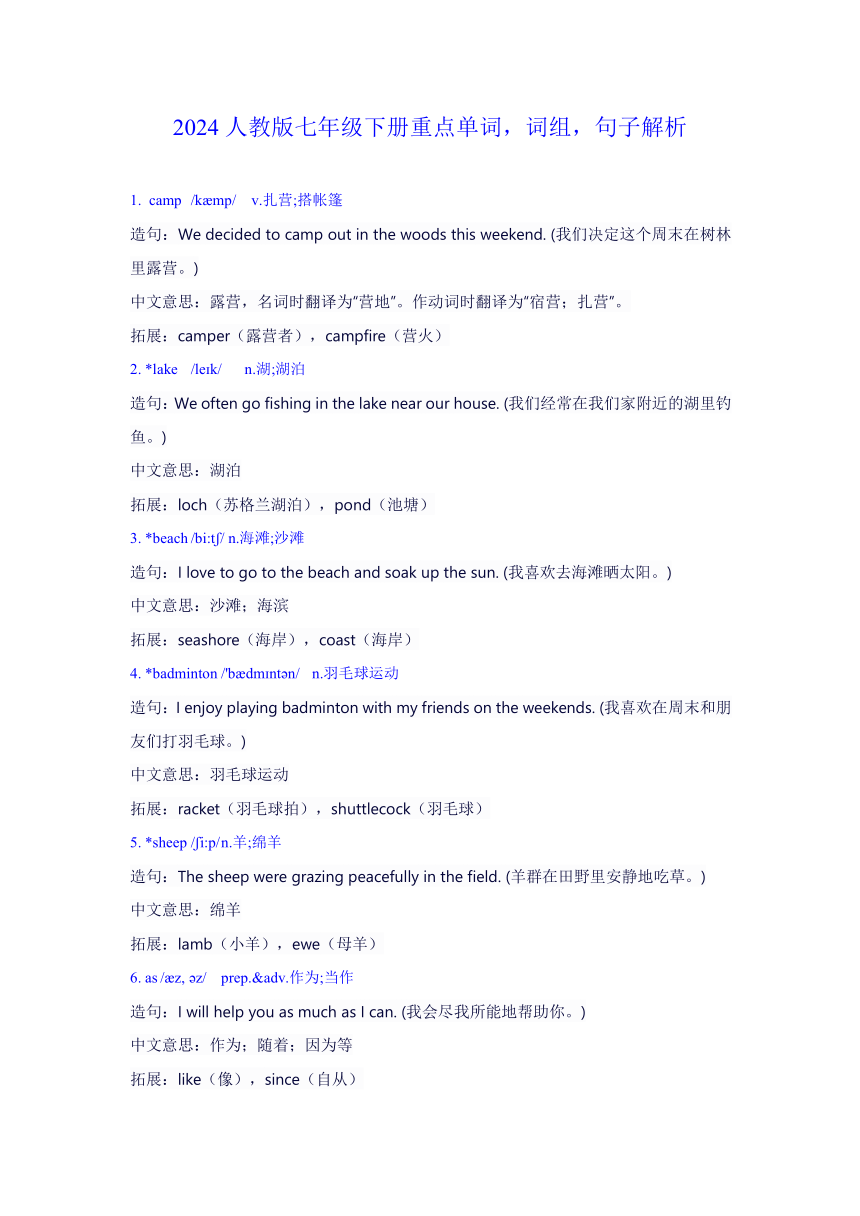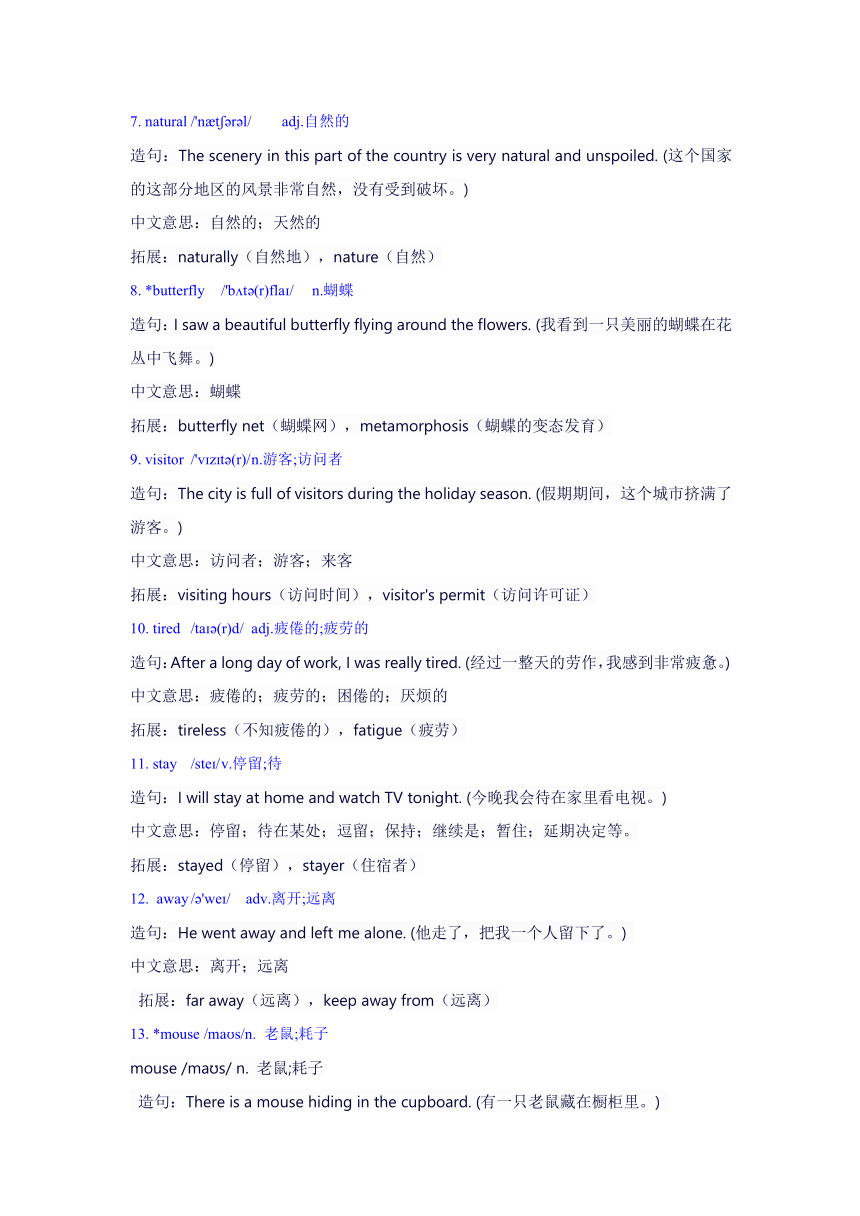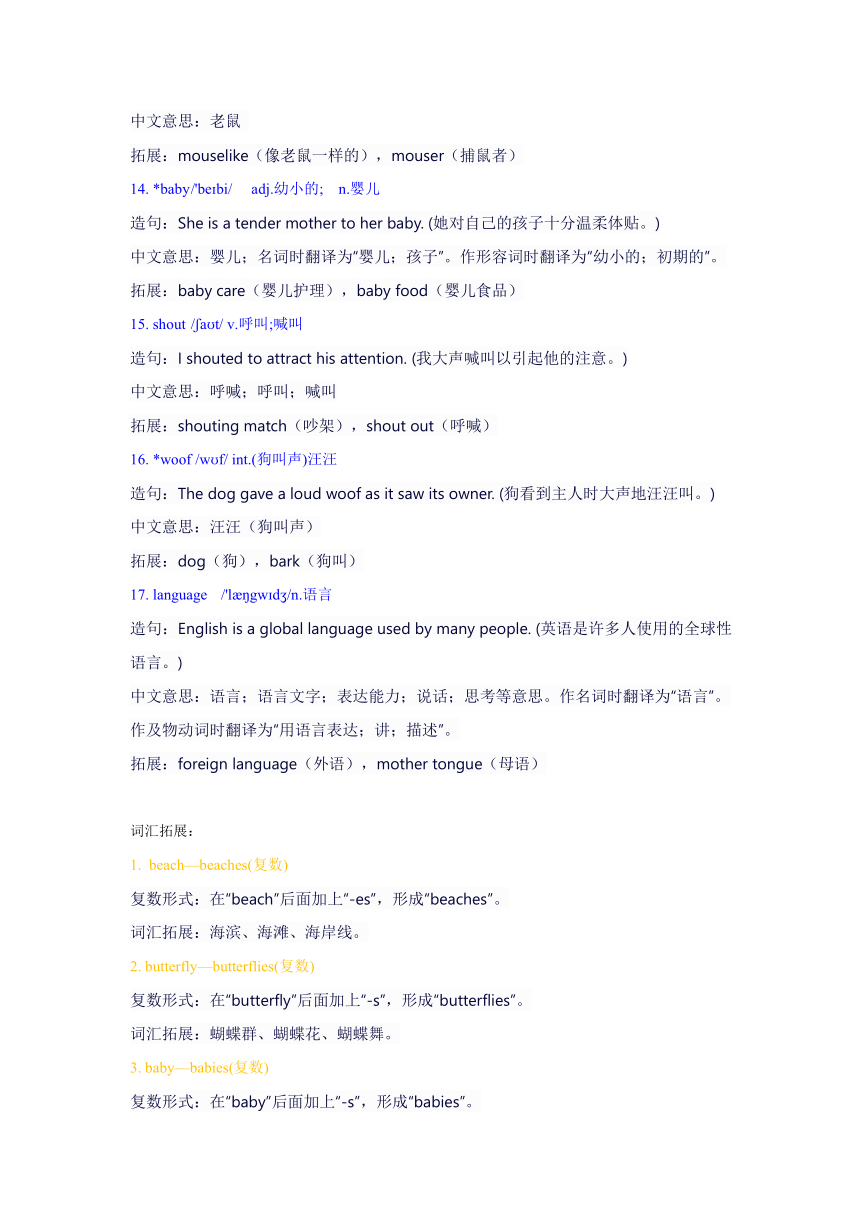人教版七年级下册Unit12What did you do last weekend?重点单词词组句子解析
文档属性
| 名称 | 人教版七年级下册Unit12What did you do last weekend?重点单词词组句子解析 |  | |
| 格式 | docx | ||
| 文件大小 | 24.5KB | ||
| 资源类型 | 教案 | ||
| 版本资源 | 人教新目标(Go for it)版 | ||
| 科目 | 英语 | ||
| 更新时间 | 2024-01-11 15:14:39 | ||
图片预览



文档简介
2024人教版七年级下册重点单词,词组,句子解析
camp /k mp/ v.扎营;搭帐篷
造句:We decided to camp out in the woods this weekend. (我们决定这个周末在树林里露营。)
中文意思:露营,名词时翻译为“营地”。作动词时翻译为“宿营;扎营”。
拓展:camper(露营者),campfire(营火)
2. *lake /le k/ n.湖;湖泊
造句:We often go fishing in the lake near our house. (我们经常在我们家附近的湖里钓鱼。)
中文意思:湖泊
拓展:loch(苏格兰湖泊),pond(池塘)
3. *beach /bi:t / n.海滩;沙滩
造句:I love to go to the beach and soak up the sun. (我喜欢去海滩晒太阳。)
中文意思:沙滩;海滨
拓展:seashore(海岸),coast(海岸)
4. *badminton /'b dm nt n/ n.羽毛球运动
造句:I enjoy playing badminton with my friends on the weekends. (我喜欢在周末和朋友们打羽毛球。)
中文意思:羽毛球运动
拓展:racket(羽毛球拍),shuttlecock(羽毛球)
5. *sheep / i:p/ n.羊;绵羊
造句:The sheep were grazing peacefully in the field. (羊群在田野里安静地吃草。)
中文意思:绵羊
拓展:lamb(小羊),ewe(母羊)
6. as / z, z/ prep.&adv.作为;当作
造句:I will help you as much as I can. (我会尽我所能地帮助你。)
中文意思:作为;随着;因为等
拓展:like(像),since(自从)
7. natural /'n t r l/ adj.自然的
造句:The scenery in this part of the country is very natural and unspoiled. (这个国家的这部分地区的风景非常自然,没有受到破坏。)
中文意思:自然的;天然的
拓展:naturally(自然地),nature(自然)
8. *butterfly /'b t (r)fla / n.蝴蝶
造句:I saw a beautiful butterfly flying around the flowers. (我看到一只美丽的蝴蝶在花丛中飞舞。)
中文意思:蝴蝶
拓展:butterfly net(蝴蝶网),metamorphosis(蝴蝶的变态发育)
9. visitor /'v z t (r)/ n.游客;访问者
造句:The city is full of visitors during the holiday season. (假期期间,这个城市挤满了游客。)
中文意思:访问者;游客;来客
拓展:visiting hours(访问时间),visitor's permit(访问许可证)
10. tired /ta (r)d/ adj.疲倦的;疲劳的
造句:After a long day of work, I was really tired. (经过一整天的劳作,我感到非常疲惫。)
中文意思:疲倦的;疲劳的;困倦的;厌烦的
拓展:tireless(不知疲倦的),fatigue(疲劳)
11. stay /ste / v.停留;待
造句:I will stay at home and watch TV tonight. (今晚我会待在家里看电视。)
中文意思:停留;待在某处;逗留;保持;继续是;暂住;延期决定等。
拓展:stayed(停留),stayer(住宿者)
away / 'we / adv.离开;远离
造句:He went away and left me alone. (他走了,把我一个人留下了。)
中文意思:离开;远离
拓展:far away(远离),keep away from(远离)
13. *mouse /ma s/n. 老鼠;耗子
mouse /ma s/ n. 老鼠;耗子
造句:There is a mouse hiding in the cupboard. (有一只老鼠藏在橱柜里。)
中文意思:老鼠
拓展:mouselike(像老鼠一样的),mouser(捕鼠者)
14. *baby /'be bi/ adj.幼小的; n.婴儿
造句:She is a tender mother to her baby. (她对自己的孩子十分温柔体贴。)
中文意思:婴儿;名词时翻译为“婴儿;孩子”。作形容词时翻译为“幼小的;初期的”。
拓展:baby care(婴儿护理),baby food(婴儿食品)
15. shout / a t/ v.呼叫;喊叫
造句:I shouted to attract his attention. (我大声喊叫以引起他的注意。)
中文意思:呼喊;呼叫;喊叫
拓展:shouting match(吵架),shout out(呼喊)
16. *woof /w f/ int.(狗叫声)汪汪
造句:The dog gave a loud woof as it saw its owner. (狗看到主人时大声地汪汪叫。)
中文意思:汪汪(狗叫声)
拓展:dog(狗),bark(狗叫)
17. language /'l gw d /n.语言
造句:English is a global language used by many people. (英语是许多人使用的全球性语言。)
中文意思:语言;语言文字;表达能力;说话;思考等意思。作名词时翻译为“语言”。作及物动词时翻译为“用语言表达;讲;描述”。
拓展:foreign language(外语),mother tongue(母语)
词汇拓展:
beach—beaches(复数)
复数形式:在“beach”后面加上“-es”,形成“beaches”。
词汇拓展:海滨、海滩、海岸线。
2. butterfly—butterflies(复数)
复数形式:在“butterfly”后面加上“-s”,形成“butterflies”。
词汇拓展:蝴蝶群、蝴蝶花、蝴蝶舞。
3. baby—babies(复数)
复数形式:在“baby”后面加上“-s”,形成“babies”。
词汇拓展:婴儿车、婴儿食品、婴儿用品。
4. tell—told(过去式)
过去式形式:在“tell”后面加上“-d”,形成“told”。
词汇拓展:讲述、讲述故事、告诉别人。
5. two—second(序数词)
序数词形式:将“two”变成序数词,需要将“two”变成“second”。
词汇拓展:第二、第二名、次要。
6. sheep—sheep(复数)
复数形式:单复数同形,所以“sheep”本身就是复数形式。
词汇拓展:绵羊群、羊毛、羊奶。
重点词组
. stay up late深夜不睡;熬夜
"I stayed up late last night, watching TV and eating junk food."
解析:这句话表示“我昨晚熬夜了,边看电视边吃垃圾食品。”其中,“stay up late”表示“熬夜”,“watching TV”和“eating junk food”是并列的动名词短语,表示同时进行的两个动作。
2. shout at… 冲……大声
"Don't shout at me! I didn't do anything wrong."
解析:这句话表示“别对我大喊大叫!我又没做错什么。”其中,“shout at sb.”是一个固定搭配,表示“冲某人大喊大叫”。
3. go boating去划船
On the weekend, we often go boating on the lake."
解析:这句话表示“周末的时候,我们经常去湖上划船。”其中,“go boating”是一个固定搭配,表示“去划船”,“on the weekend”表示“在周末”。
4. one's living habits某人的生活习惯
"My brother has very healthy living habits."
解析:这句话表示“我弟弟生活习惯很健康。”其中,“living habits”表示“生活习惯”,“healthy”表示“健康的”。
5. as a guide作为一名导游
"I want to be a guide when I grow up."
解析:这句话表示“我长大后想成为一名导游。”其中,“as a guide”表示“作为一名导游”,“when I grow up”表示“当我长大后”。
6. tell sb. about… 告诉某人关于……
"He told me about his trip to Europe."
解析:这句话表示“他告诉我他去欧洲旅行的经历。”其中,“tell sb. about sth.”是一个固定搭配,表示“告诉某人关于某事”。
have a good weekend度过一个愉快的周末
"Have a good weekend!"
解析:这句话表示“祝你周末愉快!”其中,“have a good weekend”是一个固定表达,表示“度过一个愉快的周末”
8. run away跑开
"The cat ran away when it saw the dog."
解析:这句话表示“当猫看到狗的时候,它跑开了。”其中,“ran away”表示“跑开”,“when it saw the dog”是一个时间状语从句,表示“当它看到狗的时候”。
9. last weekend上周末
I had a wonderful time last weekend!
解析:这句话表示“上周末我过得非常开心!”其中,“last weekend”表示“上周末”,“have a wonderful time”是一个固定表达,表示“过得开心”
10. camp by the lake湖畔扎营
We camped by the lake and had a great time.
解析:这句话表示“我们在湖畔扎营,度过了一段美好的时光。”其中,“camp by the lake”表示“在湖畔扎营”,“have a great time”表示“过得开心”。
11. feed sheep喂羊
On the weekend, I fed the sheep in the field.
解析:这句话表示“周末的时候,我在田里喂羊。”其中,“feed sheep”表示“喂羊”,“on the weekend”表示“在周末”。
12. butterfly house蝴蝶馆
The butterfly house is a great place to see beautiful butterflies.
解析:这句话表示“蝴蝶馆是一个观赏美丽蝴蝶的好地方。”其中,“butterfly house”表示“蝴蝶馆”,“see beautiful butterflies”表示“观赏美丽的蝴蝶”。
13. go with sb.和某人一起去
I went with my friends to the park last weekend.
解析:这句话表示“上周末我和朋友们一起去公园了。”其中,“go with sb.”表示“和某人一起去”,“last weekend”表示“上周末”。
14. play badminton打羽毛球
We played badminton after dinner and had a great workout.
解析:这句话表示“晚饭后我们打羽毛球,锻炼了一下身体。”其中,“play badminton”表示“打羽毛球”,“have a great workout”表示“锻炼了一下身体”。
重点句子解析
1. — 上个周末你做什么了?
—What did you do last weekend
解析:这句话是一个简单的问句,询问对方上周末做了什么事情。其中,“last weekend”表示“上周末”,“What did you do”是一个疑问句,表示询问对方做了什么事情。
2. — 你好, Lisa, 周末过得怎么样?
—Hi, Lisa. How was your weekend
解析:这句话是一个问候和回答的问答句。其中,“Hi, Lisa”表示问候,“How was your weekend”是一个疑问句,表示询问对方周末过得怎么样。
3. — 你周末过得愉快吗?
—Did you have a good weekend
解析:这句话是一个简单的问句,询问对方周末过得是否愉快。其中,“did you have a good weekend”是一个疑问句,表示询问对方周末过得是否愉快。
— 她和谁一起去的?
—Who did she go with
解析:这句话是一个简单的问句,询问“她”和谁一起去的某个地方。其中,“did she go with”表示“她”和谁一起去,而“Who”表示询问对象是谁。
camp /k mp/ v.扎营;搭帐篷
造句:We decided to camp out in the woods this weekend. (我们决定这个周末在树林里露营。)
中文意思:露营,名词时翻译为“营地”。作动词时翻译为“宿营;扎营”。
拓展:camper(露营者),campfire(营火)
2. *lake /le k/ n.湖;湖泊
造句:We often go fishing in the lake near our house. (我们经常在我们家附近的湖里钓鱼。)
中文意思:湖泊
拓展:loch(苏格兰湖泊),pond(池塘)
3. *beach /bi:t / n.海滩;沙滩
造句:I love to go to the beach and soak up the sun. (我喜欢去海滩晒太阳。)
中文意思:沙滩;海滨
拓展:seashore(海岸),coast(海岸)
4. *badminton /'b dm nt n/ n.羽毛球运动
造句:I enjoy playing badminton with my friends on the weekends. (我喜欢在周末和朋友们打羽毛球。)
中文意思:羽毛球运动
拓展:racket(羽毛球拍),shuttlecock(羽毛球)
5. *sheep / i:p/ n.羊;绵羊
造句:The sheep were grazing peacefully in the field. (羊群在田野里安静地吃草。)
中文意思:绵羊
拓展:lamb(小羊),ewe(母羊)
6. as / z, z/ prep.&adv.作为;当作
造句:I will help you as much as I can. (我会尽我所能地帮助你。)
中文意思:作为;随着;因为等
拓展:like(像),since(自从)
7. natural /'n t r l/ adj.自然的
造句:The scenery in this part of the country is very natural and unspoiled. (这个国家的这部分地区的风景非常自然,没有受到破坏。)
中文意思:自然的;天然的
拓展:naturally(自然地),nature(自然)
8. *butterfly /'b t (r)fla / n.蝴蝶
造句:I saw a beautiful butterfly flying around the flowers. (我看到一只美丽的蝴蝶在花丛中飞舞。)
中文意思:蝴蝶
拓展:butterfly net(蝴蝶网),metamorphosis(蝴蝶的变态发育)
9. visitor /'v z t (r)/ n.游客;访问者
造句:The city is full of visitors during the holiday season. (假期期间,这个城市挤满了游客。)
中文意思:访问者;游客;来客
拓展:visiting hours(访问时间),visitor's permit(访问许可证)
10. tired /ta (r)d/ adj.疲倦的;疲劳的
造句:After a long day of work, I was really tired. (经过一整天的劳作,我感到非常疲惫。)
中文意思:疲倦的;疲劳的;困倦的;厌烦的
拓展:tireless(不知疲倦的),fatigue(疲劳)
11. stay /ste / v.停留;待
造句:I will stay at home and watch TV tonight. (今晚我会待在家里看电视。)
中文意思:停留;待在某处;逗留;保持;继续是;暂住;延期决定等。
拓展:stayed(停留),stayer(住宿者)
away / 'we / adv.离开;远离
造句:He went away and left me alone. (他走了,把我一个人留下了。)
中文意思:离开;远离
拓展:far away(远离),keep away from(远离)
13. *mouse /ma s/n. 老鼠;耗子
mouse /ma s/ n. 老鼠;耗子
造句:There is a mouse hiding in the cupboard. (有一只老鼠藏在橱柜里。)
中文意思:老鼠
拓展:mouselike(像老鼠一样的),mouser(捕鼠者)
14. *baby /'be bi/ adj.幼小的; n.婴儿
造句:She is a tender mother to her baby. (她对自己的孩子十分温柔体贴。)
中文意思:婴儿;名词时翻译为“婴儿;孩子”。作形容词时翻译为“幼小的;初期的”。
拓展:baby care(婴儿护理),baby food(婴儿食品)
15. shout / a t/ v.呼叫;喊叫
造句:I shouted to attract his attention. (我大声喊叫以引起他的注意。)
中文意思:呼喊;呼叫;喊叫
拓展:shouting match(吵架),shout out(呼喊)
16. *woof /w f/ int.(狗叫声)汪汪
造句:The dog gave a loud woof as it saw its owner. (狗看到主人时大声地汪汪叫。)
中文意思:汪汪(狗叫声)
拓展:dog(狗),bark(狗叫)
17. language /'l gw d /n.语言
造句:English is a global language used by many people. (英语是许多人使用的全球性语言。)
中文意思:语言;语言文字;表达能力;说话;思考等意思。作名词时翻译为“语言”。作及物动词时翻译为“用语言表达;讲;描述”。
拓展:foreign language(外语),mother tongue(母语)
词汇拓展:
beach—beaches(复数)
复数形式:在“beach”后面加上“-es”,形成“beaches”。
词汇拓展:海滨、海滩、海岸线。
2. butterfly—butterflies(复数)
复数形式:在“butterfly”后面加上“-s”,形成“butterflies”。
词汇拓展:蝴蝶群、蝴蝶花、蝴蝶舞。
3. baby—babies(复数)
复数形式:在“baby”后面加上“-s”,形成“babies”。
词汇拓展:婴儿车、婴儿食品、婴儿用品。
4. tell—told(过去式)
过去式形式:在“tell”后面加上“-d”,形成“told”。
词汇拓展:讲述、讲述故事、告诉别人。
5. two—second(序数词)
序数词形式:将“two”变成序数词,需要将“two”变成“second”。
词汇拓展:第二、第二名、次要。
6. sheep—sheep(复数)
复数形式:单复数同形,所以“sheep”本身就是复数形式。
词汇拓展:绵羊群、羊毛、羊奶。
重点词组
. stay up late深夜不睡;熬夜
"I stayed up late last night, watching TV and eating junk food."
解析:这句话表示“我昨晚熬夜了,边看电视边吃垃圾食品。”其中,“stay up late”表示“熬夜”,“watching TV”和“eating junk food”是并列的动名词短语,表示同时进行的两个动作。
2. shout at… 冲……大声
"Don't shout at me! I didn't do anything wrong."
解析:这句话表示“别对我大喊大叫!我又没做错什么。”其中,“shout at sb.”是一个固定搭配,表示“冲某人大喊大叫”。
3. go boating去划船
On the weekend, we often go boating on the lake."
解析:这句话表示“周末的时候,我们经常去湖上划船。”其中,“go boating”是一个固定搭配,表示“去划船”,“on the weekend”表示“在周末”。
4. one's living habits某人的生活习惯
"My brother has very healthy living habits."
解析:这句话表示“我弟弟生活习惯很健康。”其中,“living habits”表示“生活习惯”,“healthy”表示“健康的”。
5. as a guide作为一名导游
"I want to be a guide when I grow up."
解析:这句话表示“我长大后想成为一名导游。”其中,“as a guide”表示“作为一名导游”,“when I grow up”表示“当我长大后”。
6. tell sb. about… 告诉某人关于……
"He told me about his trip to Europe."
解析:这句话表示“他告诉我他去欧洲旅行的经历。”其中,“tell sb. about sth.”是一个固定搭配,表示“告诉某人关于某事”。
have a good weekend度过一个愉快的周末
"Have a good weekend!"
解析:这句话表示“祝你周末愉快!”其中,“have a good weekend”是一个固定表达,表示“度过一个愉快的周末”
8. run away跑开
"The cat ran away when it saw the dog."
解析:这句话表示“当猫看到狗的时候,它跑开了。”其中,“ran away”表示“跑开”,“when it saw the dog”是一个时间状语从句,表示“当它看到狗的时候”。
9. last weekend上周末
I had a wonderful time last weekend!
解析:这句话表示“上周末我过得非常开心!”其中,“last weekend”表示“上周末”,“have a wonderful time”是一个固定表达,表示“过得开心”
10. camp by the lake湖畔扎营
We camped by the lake and had a great time.
解析:这句话表示“我们在湖畔扎营,度过了一段美好的时光。”其中,“camp by the lake”表示“在湖畔扎营”,“have a great time”表示“过得开心”。
11. feed sheep喂羊
On the weekend, I fed the sheep in the field.
解析:这句话表示“周末的时候,我在田里喂羊。”其中,“feed sheep”表示“喂羊”,“on the weekend”表示“在周末”。
12. butterfly house蝴蝶馆
The butterfly house is a great place to see beautiful butterflies.
解析:这句话表示“蝴蝶馆是一个观赏美丽蝴蝶的好地方。”其中,“butterfly house”表示“蝴蝶馆”,“see beautiful butterflies”表示“观赏美丽的蝴蝶”。
13. go with sb.和某人一起去
I went with my friends to the park last weekend.
解析:这句话表示“上周末我和朋友们一起去公园了。”其中,“go with sb.”表示“和某人一起去”,“last weekend”表示“上周末”。
14. play badminton打羽毛球
We played badminton after dinner and had a great workout.
解析:这句话表示“晚饭后我们打羽毛球,锻炼了一下身体。”其中,“play badminton”表示“打羽毛球”,“have a great workout”表示“锻炼了一下身体”。
重点句子解析
1. — 上个周末你做什么了?
—What did you do last weekend
解析:这句话是一个简单的问句,询问对方上周末做了什么事情。其中,“last weekend”表示“上周末”,“What did you do”是一个疑问句,表示询问对方做了什么事情。
2. — 你好, Lisa, 周末过得怎么样?
—Hi, Lisa. How was your weekend
解析:这句话是一个问候和回答的问答句。其中,“Hi, Lisa”表示问候,“How was your weekend”是一个疑问句,表示询问对方周末过得怎么样。
3. — 你周末过得愉快吗?
—Did you have a good weekend
解析:这句话是一个简单的问句,询问对方周末过得是否愉快。其中,“did you have a good weekend”是一个疑问句,表示询问对方周末过得是否愉快。
— 她和谁一起去的?
—Who did she go with
解析:这句话是一个简单的问句,询问“她”和谁一起去的某个地方。其中,“did she go with”表示“她”和谁一起去,而“Who”表示询问对象是谁。
同课章节目录
- Unit 1 Can you play the guitar?
- Section A
- Section B
- Unit 2 What time do you go to school?
- Section A
- Section B
- Unit 3 How do you get to school?
- Section A
- Section B
- Unit 4 Don't eat in class.
- Section A
- Section B
- Unit 5 Why do you like pandas?
- Section A
- Section B
- Unit 6 I'm watching TV.
- Section A
- Section B
- Review of Units 1-6
- Unit 7 It's raining!
- Section A
- Section B
- Unit 8 Is there a post office near here?
- Section A
- Section B
- Unit 9 What does he look like?
- Section A
- Section B
- Unit 10 I'd like some noodles.
- Section A
- Section B
- Unit 11 How was your school trip?
- Section A
- Section B
- Unit 12 What did you do last weekend?
- Section A
- Section B
